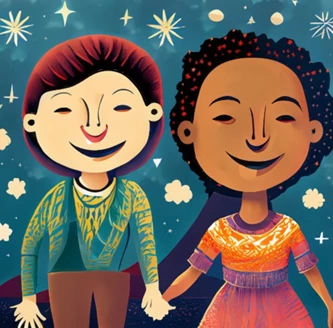 A couple has recently started dating and is in the early stages of their relationship. They have just begun to share more personal information with each other, and their interactions are becoming more frequent and intimate. Which stage of Knapp's Relational Development Model best describes the current status of their relationship?
A couple has recently started dating and is in the early stages of their relationship. They have just begun to share more personal information with each other, and their interactions are becoming more frequent and intimate. Which stage of Knapp's Relational Development Model best describes the current status of their relationship?
A) Initiating
B) Experimenting
C) Intensifying
D) Bonding
Have any idea?
If not, read on all about theories of couples development! These theories attempt to understand and explain the various stages, patterns, and dynamics that couples experience throughout their relationship journey. They often draw from psychology, sociology, and other related fields. Here are some prominent theories of couples development. You never know which will show up on the ASWB exam!
- Stage Models: Stage models propose that relationships progress through distinct phases, each characterized by unique challenges and opportunities for growth. One well-known stage model is:
- Knapp's Relational Development Model: Outlines the expected stages of relationship development. The "Coming Together" phase: Initiating, Experimenting, Intensifying, Integrating, and Bonding. The "Pulling Away" phase: Differentiating, Circumscribing, Stagnation, Avoiding, and Terminating.
- Social Exchange Theory: Posits that individuals assess the costs and rewards of their relationships and make decisions based on maximizing benefits and minimizing costs. It emphasizes the idea of equity in relationships and how individuals strive for balance in what they give and receive.
- Attachment Theory: Suggests that early attachment experiences shape an individual's attachment style, affecting how they relate to their partners. Attachment styles include secure, anxious, and avoidant.
- Interdependence Theory: Emphasizes how partners' actions and decisions are influenced by each other's behavior, thoughts, and emotions. It explores how couples become increasingly interdependent as they share resources, experiences, and goals.
- Cognitive-Developmental Theories: Propose that relationships evolve as individuals' cognitive abilities and emotional understanding develop. Jean Piaget's theory of cognitive development and Lawrence Kohlberg's theory of moral development have been applied to the study of couples.
- Gottman's Sound Relationship House Theory: Developed by John and Julie Gottman, this theory identifies seven principles essential for building a strong and healthy relationship. These principles include trust, commitment, turning towards each other, building love maps, sharing fondness and admiration, managing conflict, and creating shared meaning.
- Relational Dialectics Theory: Suggests that relationships are characterized by ongoing tensions between opposing needs or desires. For example, couples may experience tensions between autonomy and connection, predictability and novelty, or openness and closedness.
- Family Life Cycle Theory: Though originally focused on family dynamics, this theory also addresses couples. It proposes that relationships go through stages as the family unit evolves, such as marriage, the birth of children, adolescence of children, and the launching of children.
- Systems Theory: This theory views couples as interconnected systems where the actions and behaviors of one partner influence the other and the relationship as a whole. It explores how changes in one aspect of the relationship impact other aspects.
- Cognitive Interdependence Theory: Suggests that partners develop shared cognitive representations of their relationship, such as shared beliefs, attitudes, and values, which contribute to the stability and satisfaction of the relationship.
It's important to note that while these theories offer insights into understanding couples' development, individual relationships are complex and may not fit neatly into any single theory. Nonetheless, these frameworks can provide a useful starting point for studying and working with couples.
Ready for the answer to the question at the top of the post?
It’s C), the third stage in Knapp's Relational Development Model, "Intensifying." This stage is characterized by a significant increase in self-disclosure, emotional expression, and intimacy in the relationship. During this phase, the couple starts to share more personal information and reveal more about themselves to each other.
The "Bonding" stage is, as you may have noticed, the final stage of "Coming Together" in Knapp's model. Bonding involves the formalization of the relationship, such as through marriage or other commitments. Since the couple in the question is still in the early phases of their relationship and have not yet formalized their commitment, the "Intensifying" stage is the most appropriate choice.
You’re that much closer to being prepared to pass the ASWB exam.
Want to really get ready?

 A couple has recently started dating and is in the early stages of their relationship. They have just begun to share more personal information with each other, and their interactions are becoming more frequent and intimate. Which stage of Knapp's Relational Development Model best describes the current status of their relationship?
A couple has recently started dating and is in the early stages of their relationship. They have just begun to share more personal information with each other, and their interactions are becoming more frequent and intimate. Which stage of Knapp's Relational Development Model best describes the current status of their relationship?